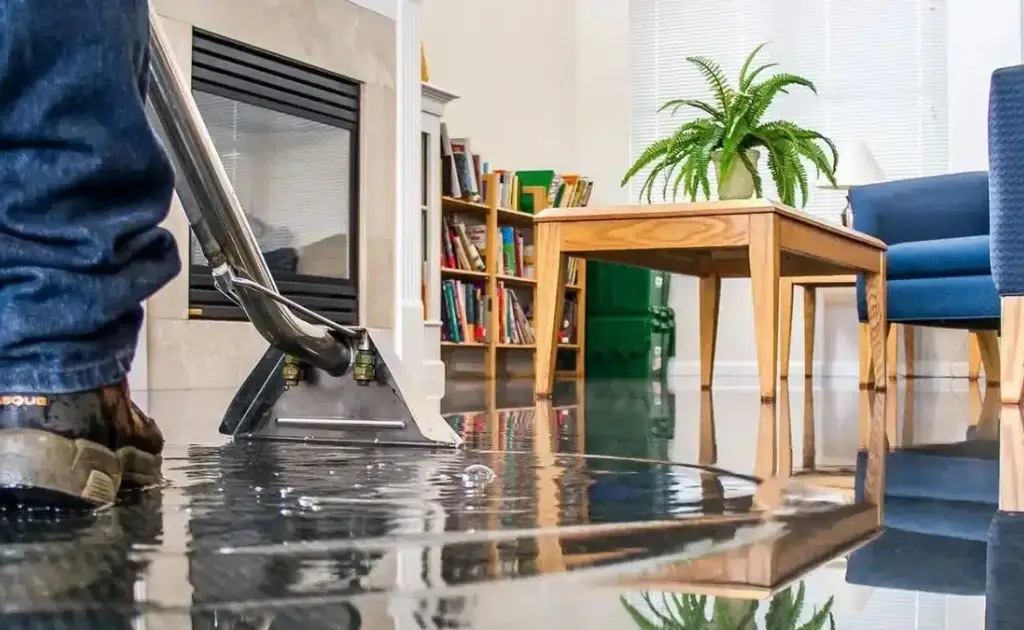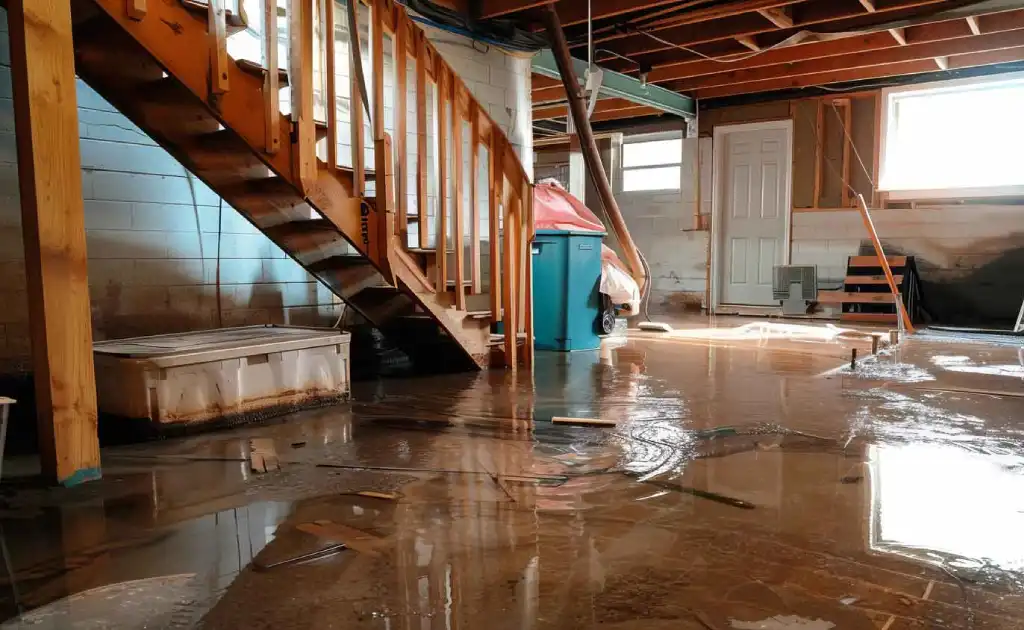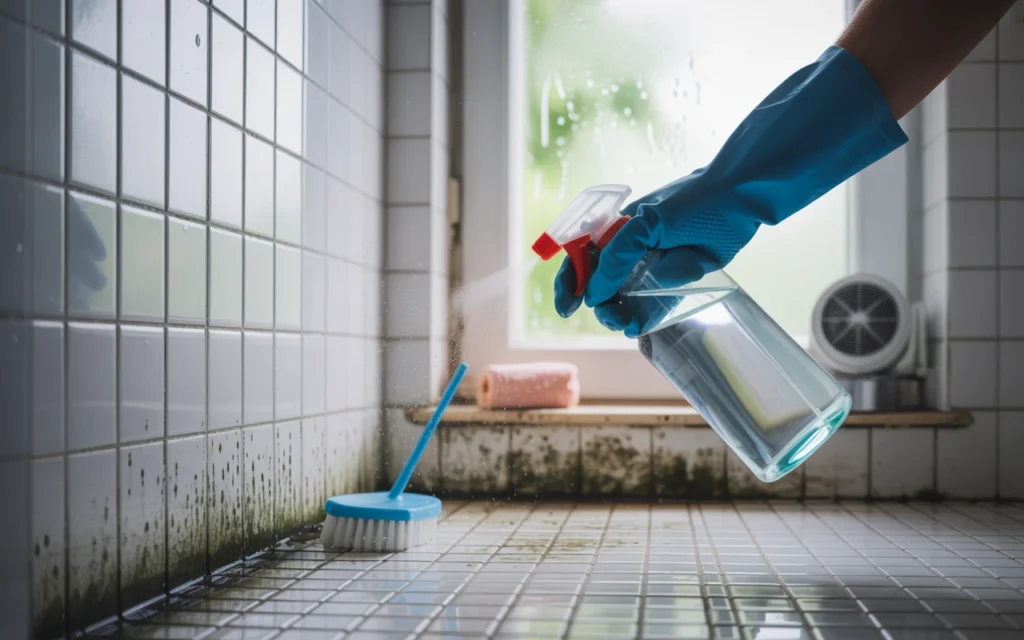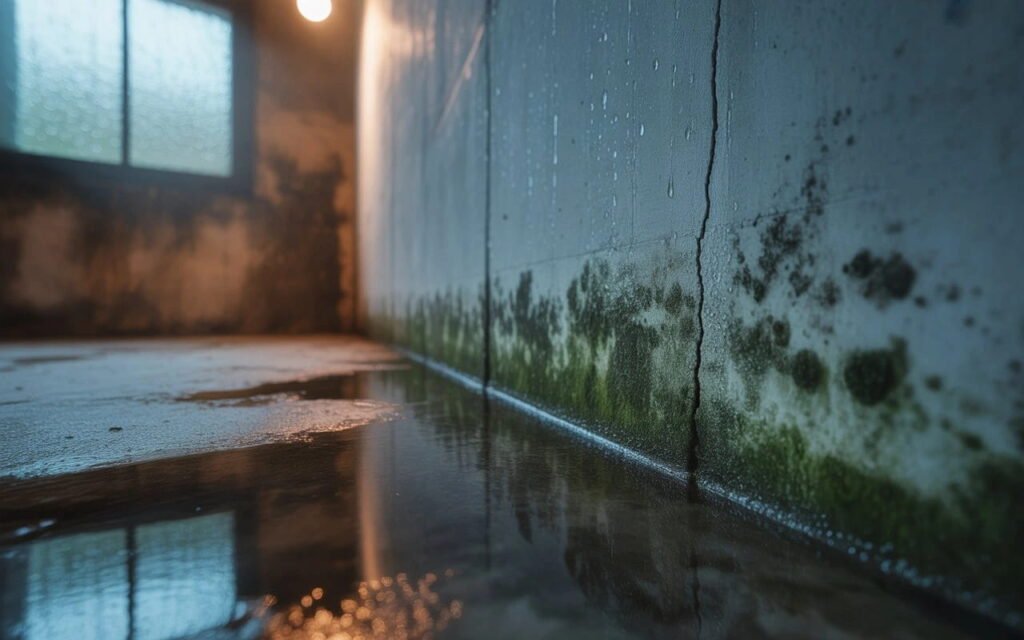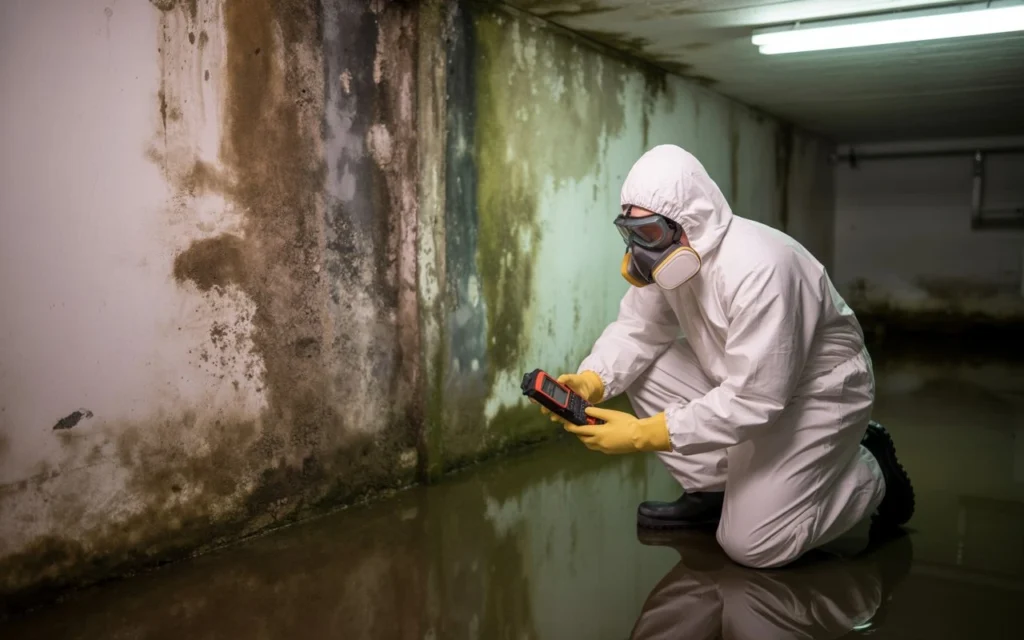Have you noticed a damp, musty smell in your Elmont home or seen fuzzy patches on your basement walls? These signs often point to mold, a common issue in Elmont, NY, where humid summers and frequent flooding create ideal conditions for fungal growth.
Mold can harm your health, causing symptoms like coughing, sneezing, or worsened asthma, and damage your property by weakening walls and floors. This guide covers mold types, identification methods, testing options, safe removal practices, and prevention strategies tailored to Elmont’s unique climate.
By the end, you’ll know how to spot mold, address it safely, and keep your home or business mold-free.
Here’s what this guide will help you understand:
- Common mold types and their health risks in Elmont properties.
- How to identify mold through visual and sensory cues.
- The difference between DIY and professional mold testing.
- Safe removal techniques and prevention tips for Elmont’s humid environment.
- Why professional expertise matters for lasting results.
Understanding Mold and Its Risks in Elmont, NY
Mold is a fungus that grows in damp, warm environments, feeding on organic materials like wood, drywall, or carpet. In Elmont, NY, humid summers and frequent flooding make homes and businesses vulnerable. Nassau County’s history of heavy rains, especially in low-lying areas, can lead to waterlogged basements where mold thrives within 24-48 hours. For example, a small pipe leak or post-flood moisture can trigger rapid mold growth on drywall or insulation.
Health risks from mold are significant. Inhaling spores can cause coughing, sneezing, itchy eyes, or asthma flare-ups, particularly for children, the elderly, or those with allergies. Some molds produce mycotoxins, chemicals linked to severe issues like sinus infections, fatigue, or neurological symptoms. Structurally, mold degrades materials, weakening walls, ceilings, and floors, which can lead to costly repairs. In Elmont, where basements often face water intrusion, addressing mold quickly is vital to protect your health and property.
This section explains mold’s growth triggers, its impact on health and structures, and why Elmont’s climate heightens these risks. Understanding these factors equips you to act proactively.
Learn more about how to address mold with our Mold Removal vs Mold Remediation article.
Common Mold Types in Elmont Homes and Businesses
Mold varies in appearance, growth habits, and health impacts. Below is a detailed overview of 15 mold types you might find in Elmont, NY, particularly in flood-prone or humid areas like basements or bathrooms. Recognizing these helps you identify risks early.
| Mold Type | Appearance | Where It Grows | How It Spreads | Health Risks |
| Stachybotrys chartarum (Black Mold) | Black, slimy, musty odor | Wet basements, drywall, wood | Airborne spores, water | Coughing, sinus infections, asthma, fatigue |
| Alternaria | Dark green/black, wooly | Sinks, showers, flooded areas | Airborne spores | Allergic reactions, asthma triggers |
| Cladosporium | Olive green/black, velvety | Fabrics, wood, bathroom ceilings | Airborne spores | Coughing, skin rashes, allergies |
| Penicillium | Blue/green, fuzzy | Food, insulation, carpets | Airborne spores, food | Sinus infections, lung inflammation |
| Cryptococcus Neoformans | Creamy/pink, smooth | Soil, bird droppings | Inhalation | Meningitis (immunocompromised) |
| Histoplasma Capsulatum | White/brown, powdery | Soil, bat/bird droppings | Airborne spores | Histoplasmosis, lung infections |
| Trichoderma | White/green, wooly | Damp wood, wallpaper | Airborne spores | Allergies, sinus infections |
| Acremonium | Pink/white, powdery | Humidifiers, drain pans | Airborne spores | Immune disorders, bone marrow issues |
| Aspergillus | Yellow/green, powdery | Damp walls, food, HVAC systems | Airborne spores | Aspergillosis, lung infections |
| Aureobasidium | Pink/black, slimy | Painted surfaces, window frames | Airborne spores | Allergies, skin/eye infections |
| Chaetomium | Gray/black, cottony, musty | Wet drywall, basements | Airborne spores | Skin/nail infections, neurological issues |
| Mucormycetes | White/gray, fluffy | Soil, compost, rotting wood | Airborne spores | Mucormycosis (sinuses, lungs, brain) |
| Serpula | Yellow/orange, velvety | Wooden beams, floors | Physical contact | Structural damage, minor allergies |
| Ulocladium | Black/brown, powdery | Flood-damaged areas, kitchens | Airborne spores | Allergies, asthma |
| Fusarium | Pink/red, wooly | Soil, water-damaged carpets | Airborne spores | Skin infections, fusariosis |
Stachybotrys chartarum, commonly called black mold, is prevalent in Elmont’s flood-damaged basements. Its slimy texture and musty odor make it recognizable, but its mycotoxins can cause serious health issues like asthma or fatigue.
Cladosporium grows in poorly ventilated bathrooms, appearing as olive-green patches. Aspergillus, found in HVAC systems or damp walls, poses risks for those with weakened immune systems, potentially causing lung infections. Less common molds like Cryptococcus Neoformans may appear near bird droppings, a concern for Elmont properties near urban parks.
Each mold spreads through airborne spores, which settle on damp surfaces to form new colonies. In Elmont, post-flood conditions accelerate this process, especially in basements or crawl spaces. Visuals of molds like black mold’s dark patches or Aspergillus’s powdery texture can aid identification. However, professional testing is often needed to confirm the type and extent of infestation, as some molds hide behind walls or mimic other substances.
Identifying Mold in Your Elmont Property
Spotting mold early prevents health issues and property damage. Begin with a visual inspection. Look for fuzzy, discolored patches black, green, white, or other colors on walls, ceilings, floors, or furniture. In Elmont, basements, bathrooms, and laundry rooms are common hotspots due to flooding and humidity. Water stains, warped drywall, or peeling paint often signal mold growth. For example, green patches on bathroom tiles or black spots in a basement corner after heavy rain are common in Elmont homes.
A musty odor is another clue, often noticeable in damp areas like attics or crawl spaces. This smell comes from mold releasing volatile organic compounds as it grows. However, some molds, like Chaetomium, hide behind walls, and others, like Histoplasma Capsulatum, are microscopic, making them hard to detect without equipment.
Be aware that not all patches are mold. Efflorescence, a white, powdery deposit on concrete, mimics mold but is a mineral buildup. Dirt or soot can also resemble mold but feels gritty, not fuzzy. To avoid misidentification, note texture and smell mold is typically fuzzy or slimy. Avoid touching suspected mold, as disturbing it can release spores, increasing risks like coughing or allergies. In Elmont’s flood-prone areas, professional inspection often provides the most reliable identification.
Testing for Mold: DIY vs. Professional Methods
How do you test what kind of mold is in your house? You can try DIY kits or hire professionals, but each approach has pros and cons. DIY mold testing kits, available at hardware stores for $10-$50, include swabs for surface sampling or petri dishes for air sampling. You collect samples and send them to a lab. These kits are affordable but often inaccurate, missing hidden mold or misidentifying types like Penicillium or Aspergillus. Disturbing mold during sampling can spread spores, potentially causing health issues like sneezing or asthma.
Professional testing offers greater accuracy. Certified inspectors use tools like air samplers, spore traps, and swabs that meet American Industrial Hygiene Association standards. They identify molds like Stachybotrys or Mucormycetes and check hidden areas, such as behind Elmont’s flood-damaged drywall or in HVAC systems. Professionals also pinpoint moisture sources, like leaks, to prevent recurrence. While costing $200-$500, this method ensures precise results and safety. In Elmont, where flooding hides mold in crawl spaces, professional testing is often the best choice for effective mold remediation.
Learn how to keep your Elmont home mold-free with professional testing and prevention tips.
Safe Mold Removal Techniques
Removing mold safely protects your health and prevents further spread. For small infestations (under 10 square feet), DIY methods can work if done carefully. Mix one part bleach to eight parts water for porous surfaces like wood or drywall, or one part bleach to 16 parts for tiles. Add a small amount of detergent to help the solution penetrate. Wear rubber gloves, goggles, and an N95 mask to avoid inhaling spores or touching mycotoxins. Seal the area with plastic sheeting to contain spores, and dispose of moldy materials, like carpets, in sealed bags outside.
Larger infestations or toxic molds like black mold require professional removal. Disturbing mold can release spores, worsening health issues like allergies or asthma. Professionals use containment barriers, HEPA-filtered vacuums, and antimicrobial treatments to eradicate mold safely. They also address moisture sources, such as leaks in Elmont’s flood-prone basements, to prevent regrowth. For example, a commercial property owner in Elmont found Cladosporium in an office. Professional removal ensured the mold was gone without spreading. After cleaning, dry the area thoroughly with fans or dehumidifiers to stop mold from returning.
Preventing Mold in Elmont Homes and Businesses
Preventing mold means controlling moisture, especially in Elmont’s humid, flood-prone climate. Maintaining indoor humidity below 60% stops mold growth. Use dehumidifiers in basements, bathrooms, or laundry rooms, and empty their reservoirs regularly.
After heavy rains, common in Elmont, check for leaks in roofs, pipes, or windows, as even small drips can fuel mold within 48 hours. For instance, a homeowner found Ulocladium in their basement after a flood, but quick drying prevented further spread.
Improve ventilation to reduce humidity. Open windows when weather allows, use exhaust fans in bathrooms and kitchens, or install ceiling fans to circulate air. Professional air duct cleaning can remove trapped spores, improving air quality in Elmont homes. Regular inspections, especially after storms, catch water damage early.
Insulate windows and doors to prevent condensation, a common issue in Elmont’s colder months. HEPA-filtered air purifiers trap spores, reducing risks like allergies, but they don’t eliminate existing mold. Combine purifiers with dehumidifiers and cleaning for best results.
Why Pick Our Mold Remediation? Your Success, Our Guarantee
When mold affects your Elmont property, you need more than surface cleaning you need experts who understand how to find and eliminate the source. Golden Touch Restoration Specialist combines experience, technology, and care to deliver lasting mold solutions tailored to Elmont’s humid climate and flood-prone environment.
24/7 Emergency Response: Our team is available day and night to handle urgent mold issues, preventing further contamination and protecting your property from structural damage.
Certified Restoration Experts: Led by professionals like Dewayne and Taniesha, our licensed and insured team uses advanced mold testing and removal techniques that meet EPA and IICRC standards.
Comprehensive Mold Solutions: From inspection and air testing to safe removal and full remediation, we provide complete end-to-end service for homes and businesses across Elmont and surrounding Nassau County areas.
Advanced Detection Equipment: We use tools like moisture meters, HEPA vacuums, and infrared cameras to detect hidden mold behind walls, floors, and HVAC systems for a thorough cleanup.
Proven Track Record: With over 60 five-star Google reviews, clients consistently commend our professionalism, efficiency, and lasting results. Homeowners like Rochelle Miller and Daniela Hader trust us to restore safety and comfort after mold damage.
Transparent and Affordable Service: We offer free inspections and clear, upfront pricing, ensuring every client receives honest recommendations and cost-effective solutions.
Golden Touch Restoration Specialist is more than a restoration company we’re your trusted partner in keeping your home healthy and mold-free. Whether you need professional testing, removal, or long-term prevention, our certified Elmont team is ready 24/7. Call (347) 551-8094 today for your free mold assessment and take the first step toward a safer, cleaner property.
FAQs About Mold Identification and Removal
How do I tell what kind of mold I have?
Mold types like Stachybotrys (black, slimy) or Penicillium (blue/green, fuzzy) have distinct looks, but visual identification isn’t reliable. Professional testing in Elmont uses air sampling and swabs to confirm molds, ensuring safe mold remediation.
How to recognize types of mold?
Look for colors and textures: black mold is slimy and black, Aspergillus is powdery yellow/green, Cladosporium is olive and velvety. Musty odors or water stains signal mold. Professional inspections in Elmont provide accurate identification.
How do I test what kind of mold is in my house?
DIY kits sample surfaces but may miss hidden mold. Professional mold testing in Elmont uses AIHA-standard tools to detect mycotoxins and identify molds like Fusarium for effective remediation
Do air purifiers help with mold?
HEPA air purifiers trap spores, reducing allergy risks in Elmont homes. They don’t remove existing mold. Pair with professional mold removal and dehumidifiers for lasting results.
Does a dehumidifier help with mold?
Yes, dehumidifiers keep humidity below 60%, preventing mold in Elmont’s damp basements. Regular maintenance and leak repairs support mold remediation efforts.
Conclusion
Mold is a serious issue in Elmont, NY, driven by humid summers and frequent flooding. Types like black mold, Aspergillus, and Cladosporium pose health risks, including coughing, allergies, and asthma, while damaging structures like drywall and wood.
Identifying mold through visual inspections or professional testing, followed by safe removal and prevention, keeps your property safe. Use dehumidifiers, fix leaks promptly, and improve ventilation to prevent growth. Golden Touch Restoration Specialist’s certified team and 24/7 response deliver thorough mold remediation.
Clients like Rochelle Miller trust us for lasting results. Contact Golden Touch at (347) 551-8094 for a free mold remediation consultation in Elmont.

